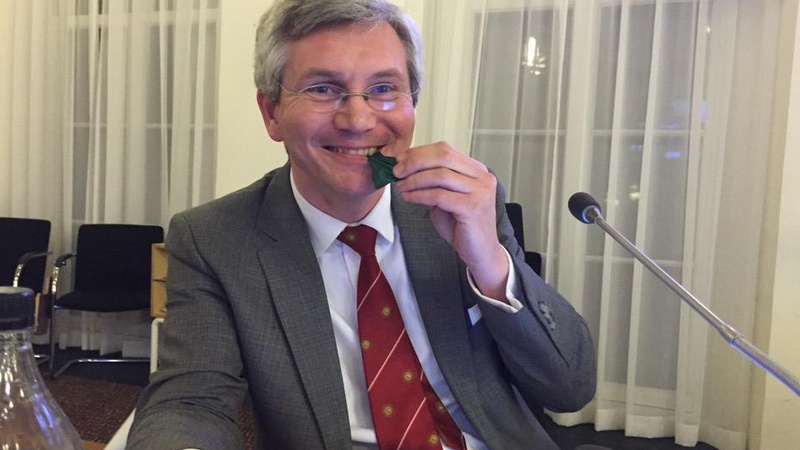Il Partito per gli Animali olandese ha fatto una denuncia per discarica di palloncini in natura
Party for the Animals MP Christine Teunissen has filed a case against Klaas Dijkhoff, leader of the Dutch governing and liberal party VVD, for dumping 500 balloons, ribbons and greeting cards in the environment. The balloons were released during a VVD congress last week. Teunissen: “Helium balloon litter is very harmful. Moreover, this was an advertising stunt and introducing promotional material into the environment is an economic offence. That is why the Party for the Animals wants to start a test case.”

The balloon is one of the common forms of litter on beaches. Balloons can end up in natural sites a long way across national frontiers or in the sea, where they contribute to the Great Pacific garbage patch and possibly enter the food chain. Birds and marine animals may get entangled in the strings or die of eating the balloon bits. The Party for the Animals in the Netherlands asks that political consideration is given to this matter. Moreover, initiatives such as Balloons Blow, Don’t Let them Go have shown that there are animal and environmentally friendly alternatives to balloons.
So-called biodegradable balloons are not a solution, as they degrade only under the right circumstances and still take years to degrade. These harmful effects were not considered by the VVD party. Teunissen: “Dijkhoff released his balloons, not having a clue of the damage he was causing. A typical example of the VVD’s short-termism. For a politician who is constantly telling others to ‘clean up their own mess’, Dijkhoff is setting a rather bad example.”

MP for the Dutch liberal party VVD eating a balloon
The liberal politicians of the VVD party seem to attach a rather high value to the release of balloons. In 2015, a VVD MP ate a balloon during a discussion on a possible ban on balloons in order to ‘show’ that balloons are supposedly safe for animals.
Test case
The Dutch Environmental Management Act among others states that deliberately dumping litter into the environment is prohibited. Furthermore, leaving promotional material in the public sphere is an economic offence. Still, the law rarely regards balloons as litter, which is not right according to the Party for the Animals.
Teunissen: “When someone who throws a can on the pavement is caught in the act, they will receive a penalty of 400 euros. But when 500 balloons with ribbons and greeting cards attached are released in the environment, there is no punishment at all. It is high time to be very clear about the dangers of balloons.”
Christine Teunissen, deputata olandese del Partito per gli Animali, ha fatto una denuncia contro Klaas Dijkhoff, leader del partito liberale e di governo olandese (VVD), a causa dello scarico di 500 palloncini, nastri e biglietti di auguri in natura. I palloncini sono stati lanciati la scorsa settimana durante il Congresso del VVD. “I palloncini di elio sono rifiuti pericolosi. Inoltre, lo stunt era una promozione e lasciare materiale promozionale nell’ambiente è un reato economico. Il Partito per gli Animali, quindi, vuole avviare un processo di prova”, spiega Teunissen.

Il palloncino è uno dei tipi più comuni di rifiuti sulle spiagge. Palloncini a volte finiscono in riserve naturali ben oltre i confini nazionali o in mare, dove contribuiscono alla zuppa di plastica e può entrare nella catena alimentare. Uccelli e animali marini possono rimanere impigliati nelle corde o morire perché mangiano i resti del palloncino. Il Partito per gli Animali olandese ne chiede l’attenzione della politica. Iniziative come Balloons Blow, Don’t Let them Go mostrano inoltre che ci sono delle alternative amichevoli per gli animali e la natura per i palloncini.
I cosiddetti palloncini biodegradabili non sono una soluzione: possono solo abbattersi nella natura nelle giuste condizioni, e che richiedono anni. Il VVD non ha avuto alcuno riguardo per questi effetti dannosi. Teunissen: “Dijkhoff saluta i suoi palloncini ma poi non ha idea delle sofferenze che provoca. Tipico del pensiero a breve termine del VVD. Un politico che non si lascia sfuggire l’occasione per urlare “si devono ripulire i propri rifiuti” fornisce un esempio sbagliato di questa azione.”

Un consigliere municipale del partito liberale olandese VVD mangia un palloncino
I politici liberali del VVD sembrano attribuire molta importanza al rilascio di palloncini. Ad esempio, nel 2015 un consigliere municipale di quel partito ha mangiato un palloncino durante una discussione su un possibile divieto del pallone, per “dimostrare” che i palloncini sono innocui per gli animali.
Processa di prova
Secondo, tra l’altro, la legge olandese sulla gestione ambientale, è vietato abbandonare deliberatamente i rifiuti nell’ambiente. Anche lasciare materiale promozionale nello spazio pubblico è un reato economico. Tuttavia, i palloncini sono raramente classificati come rifiuti all’interno della legislazione. Il Partito per gli Animali non lo ritiene coretto.
Teunissen: “Se una persona butta una lattina per strada ed è colto in flagrante riceve una multa di 400 euro. Ma se qualcuno lascia 500 palloncini con nastri e biglietti di auguri nella natura, ciò rimarrà senza pena. È ora che diventi chiaro che il materiale dei palloncini è semplicemente pericoloso.”